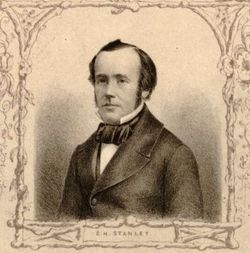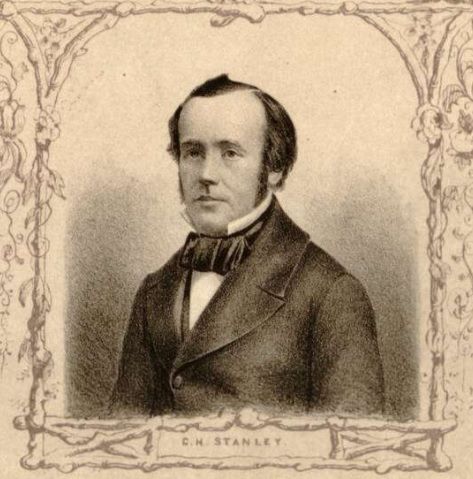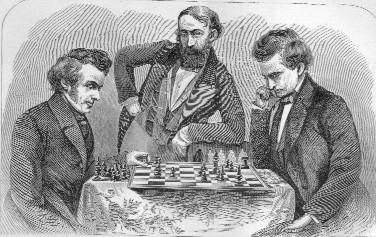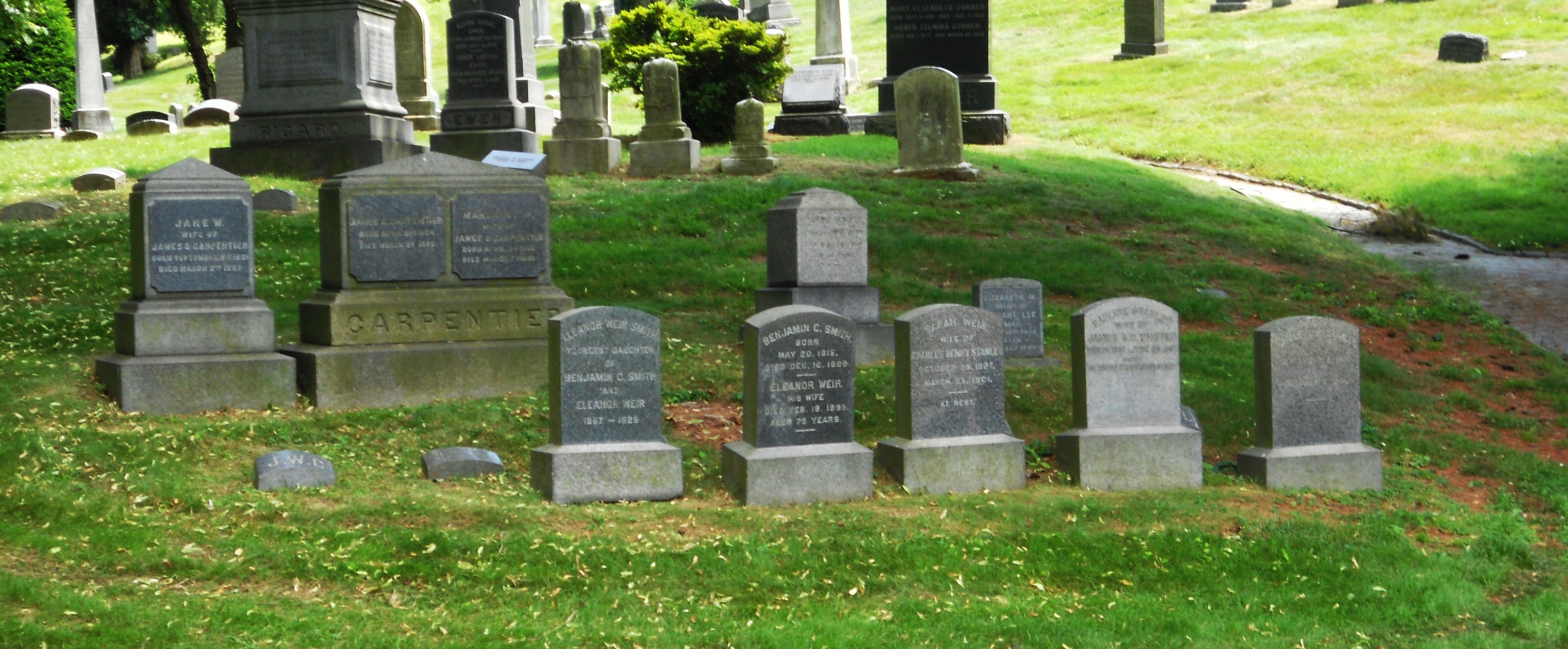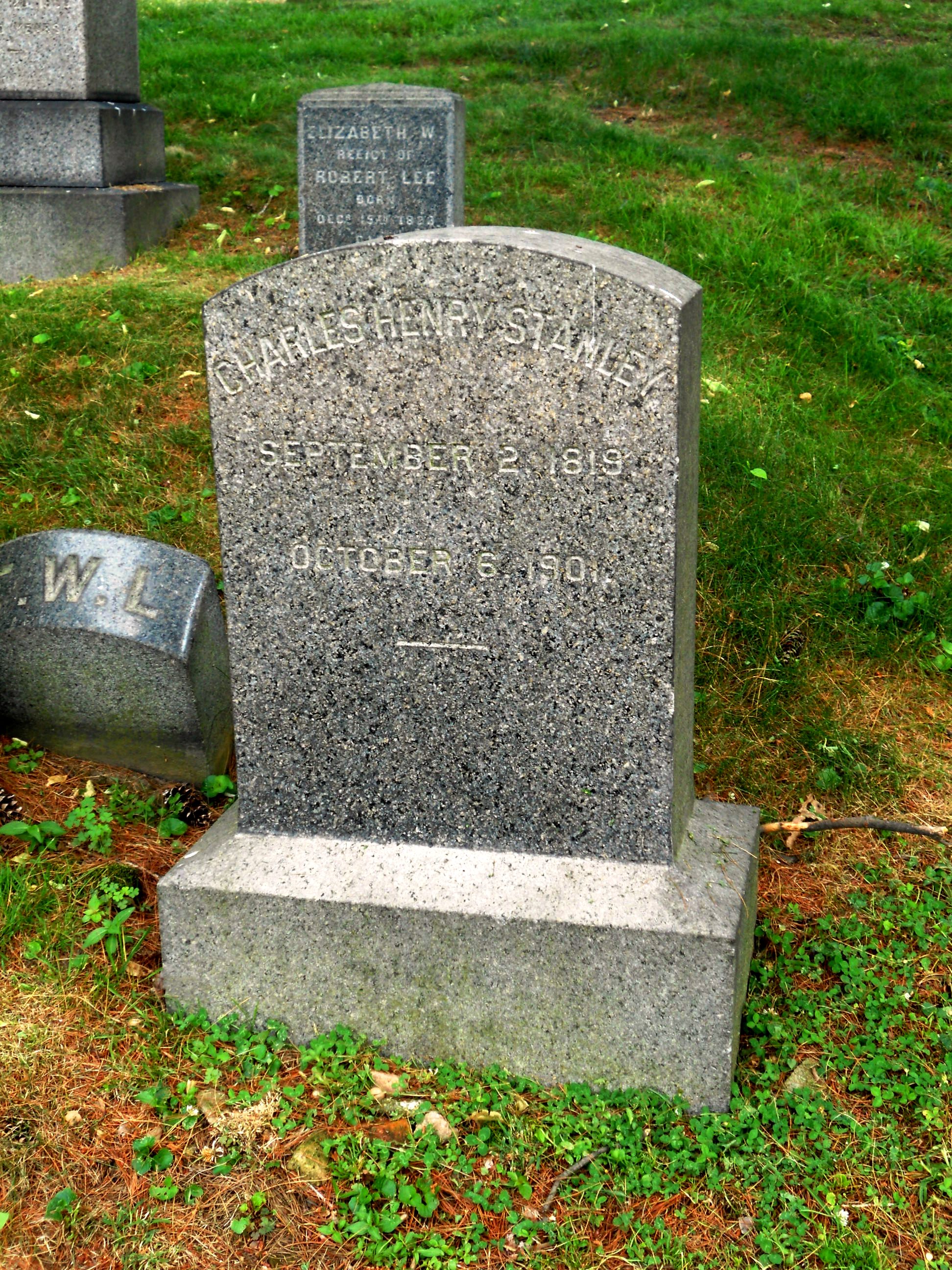mother: Anna Stanley
His occupation listed: Journalist
Died at the Home for Incurables
Widowed
Published biography
Google books
The Fifth American Chess Congress: Containing a Full Report of the Proceedings of the Convention of Chess Players, Held in New York, 1881 by Charles Alexander Gilberg
CHARLES HENRY STANLEY
Who for many years wielded the chess sceptre in this country, was born in England, in the year 1819, and gave promise at an early age of attaining a conspicuous rank among the ablest European players of the day. But destiny directed him to other fields of conquest, and, preceded by a reputation which he had then recently earned through a decisive victory over the great British champion, the late Howard Staunton, in a match wherein Mr. Stanley received the odds of Pawn and two moves, he came to New York in 1842, and at once introduced himself to the small circle of devotees then rendezvousing in Barclay Street, near Broadway. Here the extended practical experience which Mr. Stanley had obtained in his contests with some of the leading masters of the Old World, combined with a positive genius for the game, enabled him readily to overthrow our untrained amateurs, and but a single member of that enthusiastic coterie succeeded in opposing an appreciable resistance to his victorious career. This brave and persistent hero was Mr. John W. Schulten, who became Mr. Stanley's most frequent adversary, and, aside from the fluctuating fortunes of many desultory skirmishes, stoutly contested the championship title in four set matches the last of which was fought in 1846, when his persevering efforts were crowned with a gallant victory; but retiring soon afterward from the chess arena, Mr. Stanley became its undisputed master. The result of these four pitched battles, exclusive of drawn games, of which there is no record, was as follows:
First Match, (1844)....Stanley, 11 ; Schulten, 5.
Second " , (1844)….Stanley, 11 ; Schulten, 9.
Third “ , (1845)....Stanley, 15 ; Schulten, 13.
Fourth “ , (1846)….Stanley, 7; Schulten, 11.
During the year 1845 arrangements were made for a match between Mr. Stanley and Mr. Eugene Rousseau, at that time a resident of New Orleans, but a native of France, whose career as a chess player ran back to the days of De la Bourdonnais. Both rivals were regarded by their respective friends as without a superior in the country, and the magnitude of the amount ($1,000) staked upon the result of the contest served to invest the match with an interest that extended far beyond the community of chess dilettanti. The combat was opened in New Orleans on the first of December, 1845, and terminated on the twenty seventh of the same month in a victory for the New York champion by the following score:
Stanley, 15; Rousseau, 8; Drawn, 8.
Mr. Stanley's next important encounter was with Mr. J. H. Turner, of Louisville, Kentucky, and took place in Washington, D. C., in February, 1850. One thousand dollars again impended upon the issue, and the match, consisting of seventeen games, was decided in the amazingly short period of four days in Mr. Stanley's favor-the score at the conclusion of the battle being:
Stanley, 11; Turner, 5; Drawn, 1.
During the early part of the same year Mr. Stanley met the distinguished Hungarian player, Herr Löwenthal, in New York, who sought a temporary refuge in this country from political persecution in his native land, and contested several games with him, winning and losing an equal number; and in 1852 he encountered the French champion, St. Amant, during his visit to this city, with whom he played eight games, and again won and lost alike—each party scoring four games. From this period Mr. Stanley contested and won several matches of minor importance; but his chess fervor began to wane, and the cessation of continuous practice led to impairment of strength and the gradual relinquishment of the proud position which he had so long and successfully maintained. Upon the termination of the Congress, in 1857, Mr. Morphy addressed a cartel to the New York Club, proffering the odds of Pawn and move to any of its members, and a match for one hundred dollars a side was arranged at those odds between the challenger and Mr. Stanley, wherein the first winner of seven games should be the victor; but after five games had been played—the score standing: Morphy, 4; Stanley, 0; Drawn, 1---Mr. Stanley resigned the contest. In 1860 he returned for a brief period to England, and in the following year participated in the Bristol tournament of the British Chess Association, but bereft of his former powers he was defeated and thrown out from further competition by his first antagonist. Returning soon after to this city he resumed his attendance at the club, though rarely for the purpose of playing, his final services to the game being confined almost exclusively to its hebdomadal literature, in which he appeared as a graceful, vigorous, and at times, when circumstances seemed to him to require it, a most pungent and witty writer; always original and sparkling, his frequent ebullitions of wit and satirical humor, blended with a quaint seriousness, secured for his columns a wide celebrity and a numerous retinue of able contributors and appreciative readers. He was the first to inaugurate weekly chess articles in this country, making his debut in the Spirit of the Times, New York, on the first of March, 1845. His connection with that paper continued until October, 1848, after which he conducted chess departments consecutively in Porter's Spirit of the Times, The Albion; llustrated New York Journal; Harper's Weekly; Turf, Field and Farm; Round Table and the Sunday Mercury, to which latter he also contributed articles upon Whist, etc.; and during his sojourn in England in 1860–61 he edited a very lively and entertaining column in the Manchester Express and Guardian. In 1846 he published a little brochure containing his match-games with Rousseau, with critical annotations and analysis; in the following year he gave to the world his admirable Chess Magazine—the second chess periodical issued in this country and in 1859, taking advantage of the enthusiasm aroused by the splendid achievements of Paul Morphy, he published The Chess Player's Instructor, a pleasing little elementary treatise that has passed through several editions; and a small collection of Morphy's Match Games. Holding for some years a responsible position in the British Consulate in this city, chess could then only command the limited service that the affairs of his office would permit him to bestow, but during the later years of his residence in his adopted country Mr. Stanley has been untrammelled by other duties, and has given his whole leisure to the game and its literature. His labors have shed an enduring lustre upon his name and upon the noble work to which he has been so warmly devoted; yet, while we must admire the extent and success of his achievements, both as a practitioner and as an author, we cannot repress a sense of regret that an intellect so eminently fitted by inherent genius and careful culture for greater results should have so feebly resisted the terrible ravages of a melancholy intemperantia bibendi that has blighted a career of the brightest promise. One of the very few survivors that remain to link the present generation of chess players with the past, Mr. Stanley, with sympathies still warmly directed toward the object of his life-long attachment, remains with us only in the reverent memory of deeds performed; which, great as we must admit them to have been, were not commensurate with his extraordinary abilities.
mother: Anna Stanley
His occupation listed: Journalist
Died at the Home for Incurables
Widowed
Published biography
Google books
The Fifth American Chess Congress: Containing a Full Report of the Proceedings of the Convention of Chess Players, Held in New York, 1881 by Charles Alexander Gilberg
CHARLES HENRY STANLEY
Who for many years wielded the chess sceptre in this country, was born in England, in the year 1819, and gave promise at an early age of attaining a conspicuous rank among the ablest European players of the day. But destiny directed him to other fields of conquest, and, preceded by a reputation which he had then recently earned through a decisive victory over the great British champion, the late Howard Staunton, in a match wherein Mr. Stanley received the odds of Pawn and two moves, he came to New York in 1842, and at once introduced himself to the small circle of devotees then rendezvousing in Barclay Street, near Broadway. Here the extended practical experience which Mr. Stanley had obtained in his contests with some of the leading masters of the Old World, combined with a positive genius for the game, enabled him readily to overthrow our untrained amateurs, and but a single member of that enthusiastic coterie succeeded in opposing an appreciable resistance to his victorious career. This brave and persistent hero was Mr. John W. Schulten, who became Mr. Stanley's most frequent adversary, and, aside from the fluctuating fortunes of many desultory skirmishes, stoutly contested the championship title in four set matches the last of which was fought in 1846, when his persevering efforts were crowned with a gallant victory; but retiring soon afterward from the chess arena, Mr. Stanley became its undisputed master. The result of these four pitched battles, exclusive of drawn games, of which there is no record, was as follows:
First Match, (1844)....Stanley, 11 ; Schulten, 5.
Second " , (1844)….Stanley, 11 ; Schulten, 9.
Third “ , (1845)....Stanley, 15 ; Schulten, 13.
Fourth “ , (1846)….Stanley, 7; Schulten, 11.
During the year 1845 arrangements were made for a match between Mr. Stanley and Mr. Eugene Rousseau, at that time a resident of New Orleans, but a native of France, whose career as a chess player ran back to the days of De la Bourdonnais. Both rivals were regarded by their respective friends as without a superior in the country, and the magnitude of the amount ($1,000) staked upon the result of the contest served to invest the match with an interest that extended far beyond the community of chess dilettanti. The combat was opened in New Orleans on the first of December, 1845, and terminated on the twenty seventh of the same month in a victory for the New York champion by the following score:
Stanley, 15; Rousseau, 8; Drawn, 8.
Mr. Stanley's next important encounter was with Mr. J. H. Turner, of Louisville, Kentucky, and took place in Washington, D. C., in February, 1850. One thousand dollars again impended upon the issue, and the match, consisting of seventeen games, was decided in the amazingly short period of four days in Mr. Stanley's favor-the score at the conclusion of the battle being:
Stanley, 11; Turner, 5; Drawn, 1.
During the early part of the same year Mr. Stanley met the distinguished Hungarian player, Herr Löwenthal, in New York, who sought a temporary refuge in this country from political persecution in his native land, and contested several games with him, winning and losing an equal number; and in 1852 he encountered the French champion, St. Amant, during his visit to this city, with whom he played eight games, and again won and lost alike—each party scoring four games. From this period Mr. Stanley contested and won several matches of minor importance; but his chess fervor began to wane, and the cessation of continuous practice led to impairment of strength and the gradual relinquishment of the proud position which he had so long and successfully maintained. Upon the termination of the Congress, in 1857, Mr. Morphy addressed a cartel to the New York Club, proffering the odds of Pawn and move to any of its members, and a match for one hundred dollars a side was arranged at those odds between the challenger and Mr. Stanley, wherein the first winner of seven games should be the victor; but after five games had been played—the score standing: Morphy, 4; Stanley, 0; Drawn, 1---Mr. Stanley resigned the contest. In 1860 he returned for a brief period to England, and in the following year participated in the Bristol tournament of the British Chess Association, but bereft of his former powers he was defeated and thrown out from further competition by his first antagonist. Returning soon after to this city he resumed his attendance at the club, though rarely for the purpose of playing, his final services to the game being confined almost exclusively to its hebdomadal literature, in which he appeared as a graceful, vigorous, and at times, when circumstances seemed to him to require it, a most pungent and witty writer; always original and sparkling, his frequent ebullitions of wit and satirical humor, blended with a quaint seriousness, secured for his columns a wide celebrity and a numerous retinue of able contributors and appreciative readers. He was the first to inaugurate weekly chess articles in this country, making his debut in the Spirit of the Times, New York, on the first of March, 1845. His connection with that paper continued until October, 1848, after which he conducted chess departments consecutively in Porter's Spirit of the Times, The Albion; llustrated New York Journal; Harper's Weekly; Turf, Field and Farm; Round Table and the Sunday Mercury, to which latter he also contributed articles upon Whist, etc.; and during his sojourn in England in 1860–61 he edited a very lively and entertaining column in the Manchester Express and Guardian. In 1846 he published a little brochure containing his match-games with Rousseau, with critical annotations and analysis; in the following year he gave to the world his admirable Chess Magazine—the second chess periodical issued in this country and in 1859, taking advantage of the enthusiasm aroused by the splendid achievements of Paul Morphy, he published The Chess Player's Instructor, a pleasing little elementary treatise that has passed through several editions; and a small collection of Morphy's Match Games. Holding for some years a responsible position in the British Consulate in this city, chess could then only command the limited service that the affairs of his office would permit him to bestow, but during the later years of his residence in his adopted country Mr. Stanley has been untrammelled by other duties, and has given his whole leisure to the game and its literature. His labors have shed an enduring lustre upon his name and upon the noble work to which he has been so warmly devoted; yet, while we must admire the extent and success of his achievements, both as a practitioner and as an author, we cannot repress a sense of regret that an intellect so eminently fitted by inherent genius and careful culture for greater results should have so feebly resisted the terrible ravages of a melancholy intemperantia bibendi that has blighted a career of the brightest promise. One of the very few survivors that remain to link the present generation of chess players with the past, Mr. Stanley, with sympathies still warmly directed toward the object of his life-long attachment, remains with us only in the reverent memory of deeds performed; which, great as we must admit them to have been, were not commensurate with his extraordinary abilities.
Family Members
Sponsored by Ancestry
Advertisement
Records on Ancestry
Sponsored by Ancestry
Advertisement
